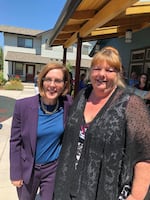
Guaranteed income programs have been gaining momentum in cities across the U.S. over the past few years. A bill in the Oregon Legislature would create the nation's first statewide guaranteed income pilot program.
Alexander Grey / Unsplash
Healthy foods, like olive oil, are a luxury for Char Reavis. But that was among the first things the Lane County resident bought when she got her federal stimulus check in 2020.
“You know, that was incredible,” said the 60-year-old Reavis, who survives off of monthly social security disability payments and SNAP benefits. “I just couldn’t get fresh and healthy foods on my income. But when I had the stimulus I could buy that way and still pay all my bills.”
Reavis also put the stimulus money towards an overdue oil change on her car. And she put some of the cash into a savings account, something she hadn’t been able to do for a very long time. Reavis said the extra money relieved financial burdens.
“I don’t think people understand when you’re really low income, the kind of stress that you’re under,” said Reavis. “You have to make choices about paying your rent or paying your electric bill or taking care of yourself, which usually ends up at the bottom.”
Some researchers have argued that the federal stimulus payments, including the monthly child tax credits, were a mass universal basic income experiment. The idea of universal basic income is to give out regular cash payments, with no strings attached, to create an income floor that would help prevent poverty. More targeted versions of the idea are known as basic income or guaranteed income.
The federal stimulus plan, which had some eligibility requirements, was designed to provide economic relief to Americans affected by COVID-19. U.S. Census Bureau data showed most people used the extra money like Reavis did: on basic household needs, like food, or they paid down existing debt.
Now, a bill in the Oregon Legislature is looking to set up a payment program that would give $1,000 a month to low or no income Oregonians over a two-year period. If passed, it would create the nation’s first statewide guaranteed income program. The proposal has sparked heated debate on the idea of unconditional cash and how it would alleviate Oregon’s homelessness and housing crisis.
Senate Bill 603, sponsored by Sen. WInsvey Campos (D-Aloha), would appropriate $25 million to create the People’s Housing Assistance Fund Demonstration Program. Oregonians who earn at or below 60% of area median income and are not receiving housing assistance would be eligible to participate in the pilot program. In addition to unrestricted payments, the bill would require the program undergo a comprehensive study of its implementation and outcomes.
Additionally, the pilot would be capped at 1,000 participants.
The statewide affordable housing advocacy group Residents Organizing for Change, or ROC, is the driving force behind the guaranteed income proposal. The group, made up of affordable housing tenants and social workers, formed in 2019 with the goal of improving housing policies in Oregon. Reavis is a founding member. She said the idea behind SB 603 came about after ROC discussed ways to increase financial stability for people with low incomes. Stimulus checks and basic income came to mind.

Char Reavis (right) with former Oregon Gov. Kate Brown at a Residents Organizing for Change event. ROC regularly meets with local, state and federal housing stakeholders.
Courtesy of Char Reavis
“Having enough income to be able to do what they needed to do to get into stable housing and into stable jobs, that was a big deal for people,” said Reavis.
There’s been an influx of guaranteed income pilot programs throughout cities in the U.S. over the past decade, including in the Pacific Northwest. The Multnomah Mother’s Trust Project has been providing $500 of unconditional cash to 100 Black mothers in Multnomah County since the summer of 2022. Another pilot program in Tacoma, Wash., wrapped up last December.
The Tacoma program is one of 35 basic income programs being studied by the Center for Guaranteed Income Research (CGIR). The center looks at how basic income affects people’s everyday lives and evaluates the design and implementation of the programs. Dr. Stacia West, a professor at the University of Tennessee’s College of Social Work, is a co-founder of the research center. West said most of the programs she studies are still in the data collection process so it’s too early to make a definitive decision on the effectiveness of basic income programs. But early data is promising.
“We don’t see any negative effects thus far,” said West. “You see positive outcomes as it relates to mental health and well being, as well as financial outcomes.”
West said participants mostly spent money on services and food to take care of their families. Forty-two percent of the more than 7,300 participants reported spending cash on retail sales and services, according to the Guaranteed Income Pilots Dashboard, a data visualization partnership between CGIR, the Stanford Basic Income Lab and Mayors for a Guaranteed Income. This share of expenditures included both small and big box stores where people buy things like toiletries, clothing, cleaning supplies, school supplies and medical items. It also included work for paid professional services, like a plumber or auto mechanic. The second largest share of participants’ money, 27%, went toward food and groceries.
“No one knows what a family needs more than the family itself,” said West about the importance of unconditional money. “The flexibility is really key and also speaks to the freedom and dignity to make your own decisions about your financial life.”
But despite the amount of national attention SB 603 has received, the potential for a statewide guaranteed income program in Oregon appears to be minimal. SB 603 may not make it far in the Legislature this year.
Republican senators slammed the bill on the senate floor this week. Many opposed to it equate the no-strings attached payments to handouts and fear that, with no restrictions, the money could be used to buy drugs or alcohol.
Others say taxpayer money should be used in more direct ways to address Oregon’s housing crisis. On the Senate floor this week, Sen. Dick Anderson (R-Lincoln City) called the bill a Band-Aid.
“The bill is certainly well intended, but I believe it will only exacerbate an issue that can be addressed through other means,” said Anderson. “We need to stay focused on the production of housing units.”
Both the advocates at ROC and the sponsor of the bill, Sen. Campos, agree that affordable housing should be the legislative priority. But they also see SB 603 as a way to bring financial stability to Oregonians who are housing insecure.
“We have to explore all the options available to us,” said Campos in an emailed statement. “We know that direct cash payments are an effective antidote to poverty and it keeps people in their homes.

Sen. WInsvey Campos is sponsoring the guaranteed income bill. She said SB 603 is an innovative solution that can provide financial security for low-income communities.
Kristyna Wentz-Graff / OPB
For now, SB 603 is running up against a key deadline in the state Legislature. If a work session is not scheduled for the bill by March 17, it will be considered dead.
